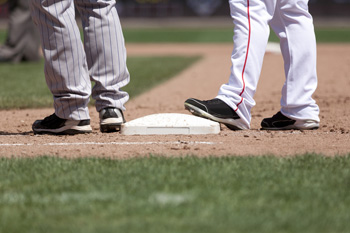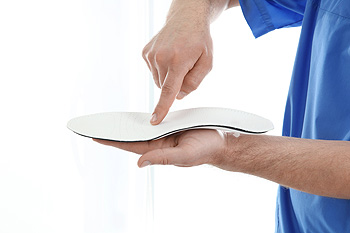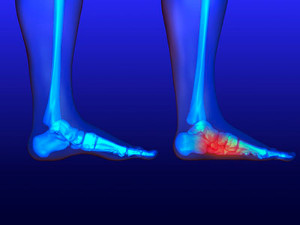
There are noticeable signs you may have a hammertoe. These can include the second toe bending in a downward direction, often resembling a hammer. Additionally, it may bend over the third toe, and it may be difficult to walk. This condition may be caused by genetic traits, or can come from wearing shoes that do not have enough room for the toes to move freely in. It is considered to be a deformity of the bones in the toes, and in severe cases, surgery may be required to permanently straighten the toes. In the beginning stages of hammertoe, mild relief may be found when larger shoes are worn that can accommodate the bent toes. Some patients find it beneficial to wear pads on the top of the affected toes, and this may help to prevent corns from developing. If you are afflicted with hammertoe, it is suggested that you speak to a podiatrist who can properly treat this condition.
Hammertoe
Hammertoes can be a painful condition to live with. For more information, contact one of our podiatrists from Achilles Foot Clinic. Our doctors will answer any of your foot- and ankle-related questions.
Hammertoe is a foot deformity that affects the joints of the second, third, fourth, or fifth toes of your feet. It is a painful foot condition in which these toes curl and arch up, which can often lead to pain when wearing footwear.
Symptoms
Causes
Genetics – People who are genetically predisposed to hammertoe are often more susceptible
Arthritis – Because arthritis affects the joints in your toes, further deformities stemming from arthritis can occur
Trauma – Direct trauma to the toes could potentially lead to hammertoe
Ill-fitting shoes – Undue pressure on the front of the toes from ill-fitting shoes can potentially lead to the development of hammertoe
Treatment
Orthotics – Custom made inserts can be used to help relieve pressure placed on the toes and therefore relieve some of the pain associated with it
Medications – Oral medications such as anti-inflammatories or NSAIDs could be used to treat the pain and inflammation hammertoes causes. Injections of corticosteroids are also sometimes used
Surgery – In more severe cases where the hammertoes have become more rigid, foot surgery is a potential option
If you have any questions, please feel free to contact one our office, located in the South of Calgary, Alberta. We offer the newest diagnostic and treatment technologies for all your foot care needs.
 First baseman Ryan Zimmerman of the Washington Nationals has suffered a “brutal” season due to plantar fasciitis in his right foot. The condition made Zimmerman’s returns to the field slow. The nature of the athlete’s injury has also made it slow to heal; fully torn plantar fascia are faster to heal, but Zimmerman’s fascia was only partly torn. Before his return on September 1st, Zimmerman rehabilitated on the treadmill. Plantar fasciitis is a common sports injury that can be disruptive to everyday life. If you think you’ve sustained a plantar fasciitis injury, contact your podiatrist.
First baseman Ryan Zimmerman of the Washington Nationals has suffered a “brutal” season due to plantar fasciitis in his right foot. The condition made Zimmerman’s returns to the field slow. The nature of the athlete’s injury has also made it slow to heal; fully torn plantar fascia are faster to heal, but Zimmerman’s fascia was only partly torn. Before his return on September 1st, Zimmerman rehabilitated on the treadmill. Plantar fasciitis is a common sports injury that can be disruptive to everyday life. If you think you’ve sustained a plantar fasciitis injury, contact your podiatrist.
Plantar fasciitis can be very painful and inconvenient. If you are experiencing heel pain or symptoms of plantar fasciitis, contact one of our podiatrists from Achilles Foot Clinic. Our doctors can provide the care you need to keep you pain-free and on your feet.
What Is Plantar Fasciitis?
Plantar fasciitis is the inflammation of the thick band of tissue that runs along the bottom of your foot, known as the plantar fascia, and causes mild to severe heel pain.
What Causes Plantar Fasciitis?
How Can It Be Treated?
While very treatable, plantar fasciitis is definitely not something that should be ignored. Especially in severe cases, speaking to your doctor right away is highly recommended to avoid complications and severe heel pain. Your podiatrist can work with you to provide the appropriate treatment options tailored to your condition.
If you have any questions, please feel free to contact one our office, located in the South of Calgary, Alberta. We offer the newest diagnostic and treatment technologies for all your foot care needs.
 Patients who have chronic foot pain may have considered wearing orthotics. They are defined as inserts that are worn inside the shoe, and may be beneficial in controlling specific types of foot pain. Orthotics are used to redistribute the weight of the body which may be helpful in relieving pain and discomfort. Patients who choose to wear orthotics may be afflicted with rheumatoid arthritis, plantar fasciitis, and find that continually wearing these custom made inserts can provide all or partial relief. If you have a foot condition that may benefit from wearing orthotics, it is advised that you seek the counsel of a podiatrist who can properly fit you for these inserts.
Patients who have chronic foot pain may have considered wearing orthotics. They are defined as inserts that are worn inside the shoe, and may be beneficial in controlling specific types of foot pain. Orthotics are used to redistribute the weight of the body which may be helpful in relieving pain and discomfort. Patients who choose to wear orthotics may be afflicted with rheumatoid arthritis, plantar fasciitis, and find that continually wearing these custom made inserts can provide all or partial relief. If you have a foot condition that may benefit from wearing orthotics, it is advised that you seek the counsel of a podiatrist who can properly fit you for these inserts.
If you are having discomfort in your feet and would like to try orthotics, contact one of our podiatrists from Achilles Foot Clinic. Our doctors can provide the care you need to keep you pain-free and on your feet.
What Are Orthotics?
Orthotics are inserts you can place into your shoes to help with a variety of foot problems such as flat feet or foot pain. Orthotics provide relief and comfort for minor foot and heel pain but can’t correct serious biomechanical problems in your feet.
Over-the-Counter Inserts
Orthotics come in a wide variety of over-the-counter inserts that are used to treat foot pain, heel pain, and minor problems. For example, arch supports can be inserted into your shoes to help correct overarched or flat feet, while gel insoles are often used because they provide comfort and relief from foot and heel pain by alleviating pressure.
Prescription Orthotics
If over-the-counter inserts don’t work for you or if you have a more severe foot concern, it is possible to have your podiatrist prescribe custom orthotics. These high-quality inserts are designed to treat problems such as abnormal motion, plantar fasciitis, and severe forms of heel pain. They can even be used to help patients suffering from diabetes by treating foot ulcers and painful calluses and are usually molded to your feet individually, which allows them to provide full support and comfort.
If you are experiencing minor to severe foot or heel pain, it’s recommended to speak with your podiatrist about the possibilities of using orthotics. A podiatrist can determine which type of orthotic is right for you and allow you to take the first steps towards being pain-free.
If you have any questions please contact one of our offices located in the North and South quadrants in Calgary, Alberta . We offer the newest diagnostic and treatment technologies for all your foot and ankle needs.
Read more about Foot Orthotics The medical term that is referred to as “pes planus” is more commonly known as flat feet. It essentially means the feet have little or no arch, and this may contribute to an overall feeling of tiredness in the feet. Genetic factors may play a significant role in the development of flat feet, in addition to wearing shoes which may include high heels that can limit toe movement. Moderate relief can be found when gentle stretching techniques are frequently performed, and this may also help to strengthen the Achilles tendon. This may be instrumental in elongating the calf muscles which can be linked to helping flat feet. If you are experiencing foot pain as a result of having flat feet, it is advised that you consult with a podiatrist who may recommend custom made orthotics that may help to provide relief.
The medical term that is referred to as “pes planus” is more commonly known as flat feet. It essentially means the feet have little or no arch, and this may contribute to an overall feeling of tiredness in the feet. Genetic factors may play a significant role in the development of flat feet, in addition to wearing shoes which may include high heels that can limit toe movement. Moderate relief can be found when gentle stretching techniques are frequently performed, and this may also help to strengthen the Achilles tendon. This may be instrumental in elongating the calf muscles which can be linked to helping flat feet. If you are experiencing foot pain as a result of having flat feet, it is advised that you consult with a podiatrist who may recommend custom made orthotics that may help to provide relief.
Flatfoot is a condition many people suffer from. If you have flat feet, contact one of our podiatrists from Achilles Foot Clinic. Our doctors will treat your foot and ankle needs.
What Are Flat Feet?
Flatfoot is a condition in which the arch of the foot is depressed and the sole of the foot is almost completely in contact with the ground. About 20-30% of the population generally has flat feet because their arches never formed during growth.
Conditions & Problems:
Having flat feet makes it difficult to run or walk because of the stress placed on the ankles.
Alignment – The general alignment of your legs can be disrupted, because the ankles move inward which can cause major discomfort.
Knees – If you have complications with your knees, flat feet can be a contributor to arthritis in that area.
Symptoms
Treatment
If you are experiencing pain and stress on the foot you may weaken the posterior tibial tendon, which runs around the inside of the ankle.
If you have any questions, please feel free to contact one our office, located in the South of Calgary, Alberta. We offer the newest diagnostic and treatment technologies for all your foot care needs.